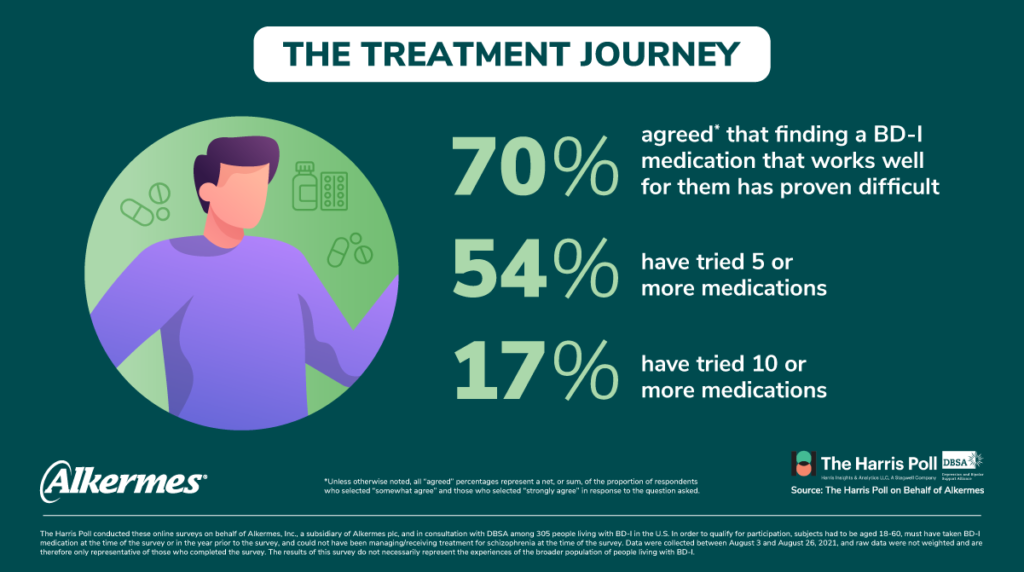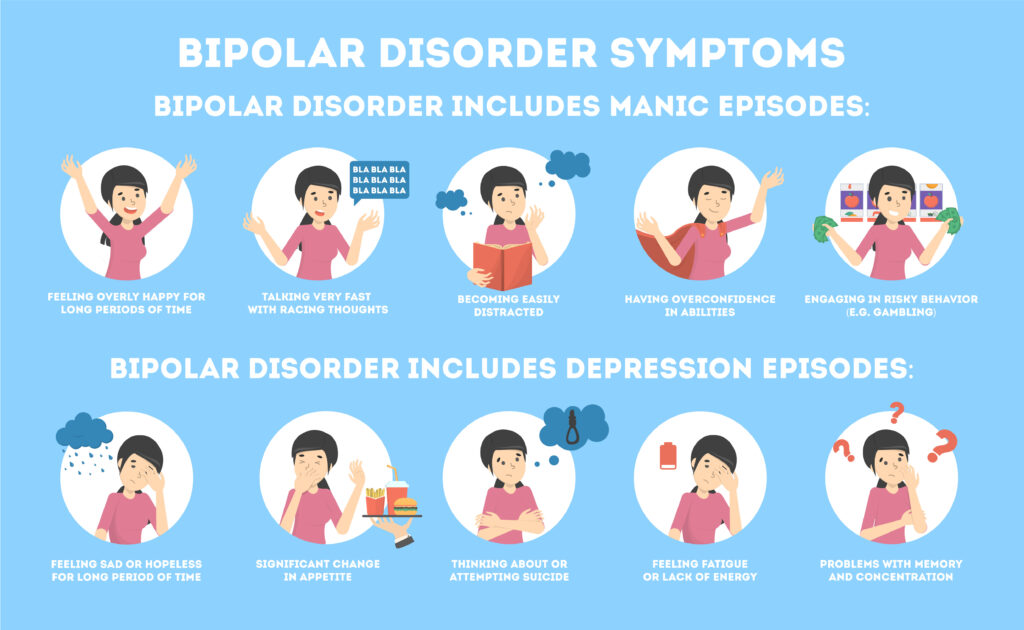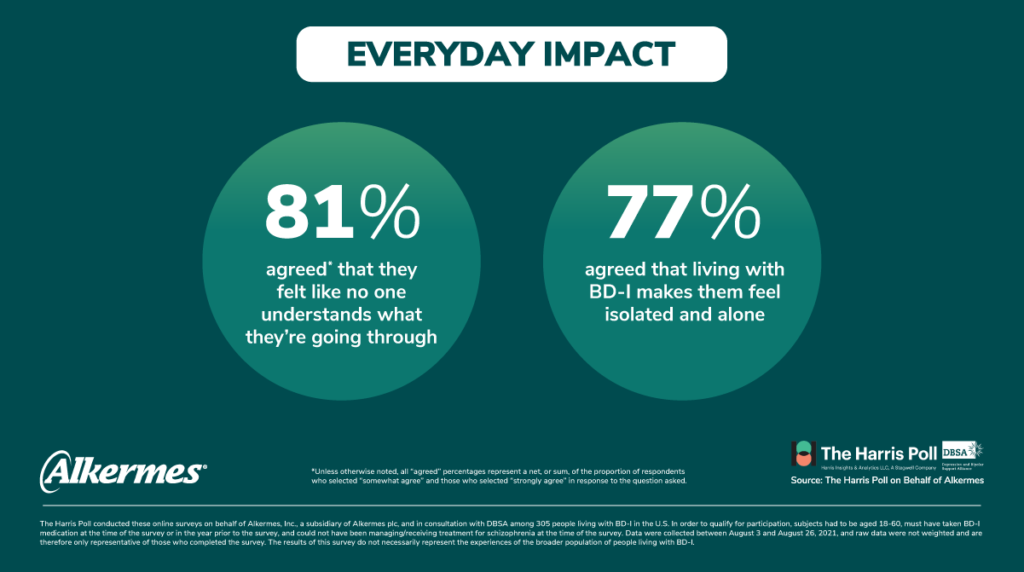Unravel the mysteries of bipolar disorder and discover why it remains one of the most misunderstood mental health conditions today.
Table of Contents
- Introduction: Decoding Bipolar Disorder
- What is Bipolar Disorder?
- Common Myths About Bipolar Disorder
- The Various Types of Bipolar Disorder
- Understanding Clinical Depression
- How People Confuse Sadness with Bipolar Disorder
- The Role of Treatment in Managing Bipolar Disorder
- Why Awareness About Bipolar Disorder Is Important
- How to Support Someone with Bipolar Disorder
- Busting the Stigma Surrounding Mental Health
- Conclusion: Embracing Understanding and Compassion
- FAQs (Frequently Asked Questions)
Introduction: Decoding Bipolar Disorder
Understanding bipolar disorder is like solving a puzzle. This mental health condition can be tricky to grasp, leading to a lot of misunderstandings. Let’s dive into what bipolar disorder really is and why it might be confusing for some people.
So, what exactly is bipolar disorder? This term refers to a mental health condition that causes a person to experience extreme mood swings. These mood swings can range from feeling super high and energized to feeling very low and hopeless. People with bipolar disorder go through these intense mood shifts, which can be difficult to understand for those who don’t experience them.
What is Bipolar Disorder?
In order to understand why bipolar disorder is often misunderstood, it’s important to first grasp what this condition actually is. Bipolar disorder is a mental health condition that affects a person’s mood, causing them to experience intense mood swings.
A Look at Mood Swings
When we talk about mood swings in bipolar disorder, we’re not referring to the usual ups and downs that everyone experiences from time to time. These mood swings in bipolar disorder are much more extreme and can vary from feeling extremely high and full of energy (which is called mania) to feeling very low and hopeless (known as depression).
Common Myths About Bipolar Disorder
There are many misunderstandings surrounding bipolar disorder that can lead to stigma and confusion. Let’s debunk some common myths to help you better understand this mental health condition.

Image courtesy of www.dbsalliance.org via Google Images
Myth: Bipolar Disorder is Just Mood Swings
Contrary to popular belief, bipolar disorder is not just about regular mood swings that everyone experiences. People with bipolar disorder go through extreme mood changes that are more intense and disruptive to their daily lives.
Myth: People with Bipolar Disorder Are Violent
It’s important to recognize that having bipolar disorder does not make someone inherently violent. Like everyone else, individuals with bipolar disorder have different personalities and behaviors. Violence is not a defining characteristic of this condition.
Myth: Bipolar Disorder is Just a Phase
Bipolar disorder is a chronic mental health condition that requires lifelong management. It’s not something that someone can simply “snap out of” or that will go away on its own over time.
Myth: People with Bipolar Disorder Are Always Happy or Sad
Contrary to this myth, individuals with bipolar disorder don’t always experience extreme happiness (mania) or deep sadness (depression). There are periods of stability in between, and the mood shifts can vary in intensity and duration.
By debunking these myths, we can better understand and support those living with bipolar disorder and create a more compassionate and informed community.
The Various Types of Bipolar Disorder
Bipolar disorder is not a one-size-fits-all condition; there are actually different types that can affect individuals in various ways. Understanding these different types can help explain why one person’s experience with bipolar disorder might be different from another’s.
A Look at Mood Swings
One of the key features of bipolar disorder is the presence of extreme mood swings. These mood swings are not the same as the usual ups and downs that everyone experiences from time to time. In bipolar disorder, these mood swings can be intense and unpredictable, causing significant disruptions in a person’s life.
Understanding the various types of bipolar disorder can help individuals and their loved ones recognize the unique challenges and symptoms associated with each subtype, leading to more effective treatment and support.
Understanding Clinical Depression
Clinical depression, also known as major depressive disorder, is a serious mental health condition that affects how you feel, think, and handle everyday activities. It is closely related to bipolar disorder, but they are not exactly the same. Let’s take a closer look at what clinical depression entails.

Image courtesy of comphc.org via Google Images
How People Confuse Sadness with Bipolar Disorder
When it comes to understanding bipolar disorder, it’s essential to differentiate between normal feelings of sadness and the more severe depressive episodes associated with the condition. Clinical depression, a key component of bipolar disorder, is not the same as feeling sad about something specific like not getting a toy you wanted or missing a friend.
Clarifying the Difference
Sadness is a normal emotion that everyone experiences from time to time. It can be triggered by events like an argument with a friend or not doing well on a test. However, these feelings of sadness usually pass relatively quickly and don’t severely impact a person’s ability to function in their daily life.
On the other hand, the depressive episodes in bipolar disorder are much more intense and can last for weeks or even longer. During these periods, individuals may feel overwhelmingly sad, hopeless, and lose interest in activities they once enjoyed. They might have trouble sleeping, experience changes in appetite, and struggle to concentrate.
It’s important to remember that while sadness is a normal part of life, the depression in bipolar disorder is a clinical condition that requires support and treatment from medical professionals.
The Role of Treatment in Managing Bipolar Disorder
Living with bipolar disorder can be challenging, but there are ways to manage the symptoms and improve quality of life. Treatment plays a crucial role in helping individuals with bipolar disorder lead fulfilling lives.

Image courtesy of www.dbsalliance.org via Google Images
Medication and Bipolar Disorder
Medication is often a key aspect of managing bipolar disorder. Doctors may prescribe mood stabilizers, antipsychotic medications, or antidepressants to help control mood swings and other symptoms. It’s essential to take medications as prescribed and communicate any side effects or concerns with your healthcare provider.
Natural Supplements and Their Benefits
In addition to traditional medications, some people find relief from bipolar symptoms by incorporating natural supplements into their treatment plan. Omega-3 fatty acids, found in fish oil, have been shown to support brain health and may help ease symptoms of bipolar disorder. Ashwagandha, an herb used in Ayurvedic medicine, is known for its stress-relieving properties and may help regulate mood.
It’s important to consult with a healthcare provider before starting any new supplement regimen, as interactions with medications or other health conditions could occur.
Why Awareness About Bipolar Disorder Is Important
Understanding what bipolar disorder is and how it affects people is crucial. When we increase awareness about bipolar disorder, it helps reduce misunderstandings and provides support to those who are dealing with it.
Reducing Misconceptions
Many people have misunderstandings about bipolar disorder, which can lead to stigma and discrimination. By raising awareness and educating others about what bipolar disorder really is, we can break down these misconceptions.
Supporting Those Affected
When more people are aware of bipolar disorder, it creates a more supportive environment for those who are living with it. Understanding and empathy are essential in helping individuals feel accepted and supported.
Promoting Mental Health
Increasing awareness about bipolar disorder also shines a light on mental health as a whole. By discussing mental health openly and honestly, we show that it is a common and important part of overall well-being.
| Reasons | Explanation |
|---|---|
| Lack of awareness | Many people are unaware of what bipolar disorder is and how it affects individuals, leading to misconceptions and stereotypes. |
| Misrepresentation in media | Portrayals of bipolar disorder in movies, TV shows, and news articles often sensationalize symptoms or inaccurately depict the condition. |
| Stigma surrounding mental health | There is still a stigma attached to mental health issues, including bipolar disorder, which can prevent open discussions and understanding. |
| Misdiagnosis and comorbidity | Bipolar disorder is often misdiagnosed as other mental illnesses or misunderstood as a standalone condition, leading to confusion and misinformation. |
Awareness about bipolar disorder is like turning on a light in a dark room – it helps us see things more clearly and encourages compassion and understanding for those who are navigating the challenges of this condition.
How to Support Someone with Bipolar Disorder
Supporting someone with bipolar disorder can make a significant difference in their journey towards managing their condition. Here are some ways you can provide support:
Image courtesy of mindscape-for-youth.medium.com via Google Images
Understanding Their Challenges
One crucial aspect of supporting someone with bipolar disorder is to educate yourself about the condition. Understanding the symptoms, triggers, and treatment options can help you empathize with their struggles.
Encouraging Treatment
Supporting your loved one in seeking professional help and adhering to their treatment plan is essential. Encourage them to attend therapy sessions, take their medication as prescribed, and engage in healthy lifestyle choices.
Being Patient and Compassionate
Dealing with bipolar disorder can be overwhelming at times. It’s important to be patient, understanding, and compassionate towards your loved one. Listen to their concerns, offer reassurance, and be there for them when they need emotional support.
Creating a Supportive Environment
Creating a supportive environment for someone with bipolar disorder can contribute to their overall well-being. Encourage them to engage in activities that promote relaxation and reduce stress. A stable and positive environment can help manage mood swings and prevent episodes.
Communicating Openly
Open and honest communication is key in supporting someone with bipolar disorder. Encourage them to express their feelings, concerns, and needs. Be a good listener and validate their emotions without judgment.
By offering understanding, patience, and support, you can make a positive impact on the life of someone with bipolar disorder. Remember, everyone’s journey with bipolar disorder is unique, and your unwavering support can make a world of difference.
Busting the Stigma Surrounding Mental Health
Mental health is like physical health; we all have it, and it’s essential to take care of it. However, there is often a stigma attached to mental health issues, making it harder for people to seek help when they need it. Let’s explore how we can break down this stigma and support one another in managing conditions like bipolar disorder.
Understanding the Stigma
Stigma is when people view those with mental health conditions negatively because of misconceptions or lack of understanding. This can lead to discrimination, fear, and isolation for those struggling with their mental health. It’s crucial to remember that having a mental health condition is not a sign of weakness.
Challenging Misconceptions
One common misconception is that people with mental health issues are “crazy” or dangerous. In reality, the vast majority of individuals with mental health conditions are not violent. By educating ourselves and others about the realities of mental health, we can challenge these harmful stereotypes and support those in need.
Encouraging Open Conversations
One of the best ways to break the stigma surrounding mental health is by talking about it openly and honestly. By sharing our own experiences or listening to others without judgment, we create a safe and supportive environment for those struggling with conditions like bipolar disorder. We can all play a role in normalizing conversations about mental health.
Showing Compassion and Empathy
Empathy is about understanding and sharing the feelings of another person. By showing compassion towards those dealing with mental health challenges, we can help reduce the isolation and loneliness they may feel. Simple acts of kindness, like listening without judgment or offering a helping hand, can make a significant difference in someone’s life.
Overall, breaking the stigma surrounding mental health requires a collective effort. It’s essential to treat mental health with the same care and respect as physical health. By fostering understanding, compassion, and empathy, we can create a more supportive and inclusive society for all individuals, including those living with conditions like bipolar disorder.
Conclusion: Embracing Understanding and Compassion
Understanding is like putting on someone else’s shoes and walking in them for a little while. It helps us see the world from a different perspective. When it comes to bipolar disorder, it’s crucial to understand that it’s not just about being happy one moment and sad the next. It’s a complex mental health condition that requires patience, support, and compassion. By embracing understanding and compassion, we can create a more inclusive and empathetic world for everyone.

Image courtesy of www.thehubct.org via Google Images
When we take the time to learn about bipolar disorder, we break down the barriers of misunderstanding and judgment. We realize that those who are living with the condition are not defined by it. They are individuals with unique stories, struggles, and strengths. By opening our minds and hearts to their experiences, we can offer the support and kindness that everyone deserves.
Compassion is like a warm hug for the soul. It’s about showing empathy and care towards others, especially when they are facing challenges. People with bipolar disorder may go through difficult times, but with understanding and compassion from those around them, they can feel less alone and more supported.
So, let’s hold hands with understanding and compassion as we navigate the world of mental health. Let’s spread awareness, debunk myths, and break the stigma surrounding bipolar disorder. Together, we can create a safe and accepting space where everyone feels valued and understood. And remember, kindness and empathy are free to give but priceless to receive.
FAQs (Frequently Asked Questions)
What is bipolar disorder?
Bipolar disorder is a mental health condition that causes extreme mood swings that include emotional highs (mania or hypomania) and lows (depression).
How are mood swings in bipolar disorder different from normal ups and downs?
In bipolar disorder, mood swings can be intense and sudden, lasting for days, weeks, or even longer. These extreme mood changes can disrupt a person’s life and relationships.
Is bipolar disorder the same for everyone?
No, there are different types of bipolar disorder, ranging from Bipolar I to Bipolar II. Each type has its own set of symptoms and patterns of mood swings, making the experience unique to each individual.
What is clinical depression?
Clinical depression is a serious mood disorder that causes persistent feelings of sadness and loss of interest in activities. It is a common part of bipolar disorder.
How can natural supplements like omega 3 and ashwagandha help with bipolar disorder?
Some research suggests that omega 3 fatty acids and ashwagandha may have benefits for mental health, including supporting mood stability in individuals with bipolar disorder. However, it is essential to consult a healthcare professional before incorporating these supplements into a treatment plan.
How can we support someone with bipolar disorder?
One of the best ways to support someone with bipolar disorder is to understand their condition and be patient and empathetic. Encouraging them to seek professional help and taking care of their overall well-being can make a significant difference.





